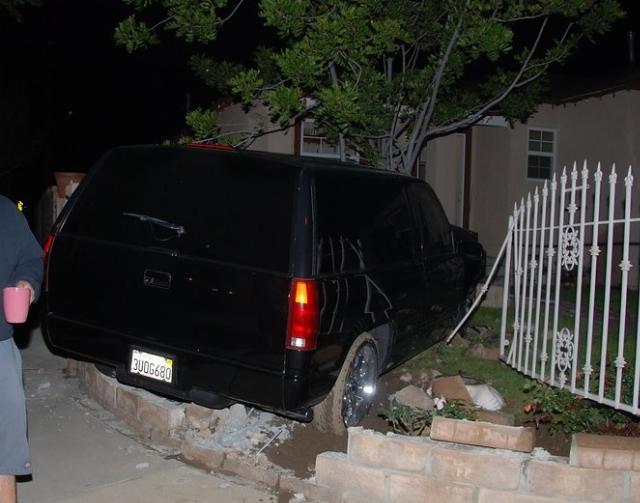We support our Publishers and Content Creators. You can view this story on their website by CLICKING HERE.
Who is legally responsible for a vehicle accident that happens on private property? The answer depends on several factors, but unlike accidents that happen on public roads where the state generally has no liability, a private property owner can be held liable if their duty of care has been breached.
Most people will never have to experience a car accident taking place on their private property. It seems a bit unlikely for a genuine accident to occur in your driveway or front yard, although it does happen. Surprisingly, there have been a handful of accidents reported where a driver lost control of their car, veered off the road, and crashed through someone’s house or garage. This sort of thing happens more frequently to businesses, like retail shops and liquor stores.
It’s also not unheard of for a semi-truck to crash into a house, and many times, the driver is under the influence of drugs or alcohol, or is fatigued from driving long distances. If you’re a homeowner and you’ve never considered this possibility, it’s time to start thinking about what you’d do if this happened on your property since you can be held liable for damages.
If this happens to you, call an attorney right away
If you find yourself in a situation where a car or truck has crashed into your house or has hit a vehicle or person on your property, you’ll want to contact a lawyer after any injured parties seek medical care. If the accident involved a semi or tractor-trailer, you can hold the trucking company responsible. Regardless of what the police can or cannot do to help, a truck accident attorney will be able to help you sort out the legal aspect of your situation.
Whatever you do, don’t look for advice on Google or use an AI tool to get advice. Both of these resources can be immensely helpful in other ways, but can’t give you trustworthy advice like you’d get from a lawyer.
Document the accident
Just like any other accident, document everything possible, including the date, time, and specific location of the accident. Take photos from every possible angle before  anyone moves the vehicle(s) involved. You’ll need this documentation to prove your case either to your insurance company or to a judge or jury if you take your case to court.
anyone moves the vehicle(s) involved. You’ll need this documentation to prove your case either to your insurance company or to a judge or jury if you take your case to court.
Be honest about what you think may have caused the accident. Property owners are legally obligated to maintain their property, inspect it, and fix hazards or warn people about known hazards. If the accident was directly caused by your failure to maintain your property or inform someone of a hazard, you’ll likely be held partially responsible, which will reduce your compensation by your percentage of fault. For example, crumbling pavement/concrete and potholes can cause accidents, even if it’s right in your own driveway. You might be used to navigating around these hazards, but your guests won’t be, and that can cause an accident.
Beware of insurance company settlement offers
After the emotional dust settles and you start to deal with the situation, if you’re covered, your insurance company will probably give you a settlement offer. This offer will be extremely low since insurance companies don’t pay much for claims. It’s unfortunate, but when you pay your insurance premiums every month, you’re paying for the chance to be reimbursed only a fraction of what you should be compensated. Insurance companies are for-profit corporations that protect their profits by low balling offers. Each claim has a maximum payout assigned that the adjuster can’t exceed. Trying to negotiate is a losing game from the start.
Never accept the first settlement offer from an insurance company because it will be far less than what you’re entitled to receive. Instead of dealing with an insurance company, connect with an attorney to get a case evaluation. If you have a strong case, your attorney will use their experience and expertise to fight for the compensation you deserve.
Ask the police to create a police report
Lastly, get a police report. Depending on the state you live in, there’s a chance that police won’t even respond to a car or truck accident on your property unless it’s part of a crime in progress. Regardless of where you live, you have the right to get a police report.
Even if the police tell you they can’t do anything about the accident, ask them to come out and document the scene. You will need a police report if you’re going to claim the damage through insurance, so never skip this step. The police may not be able to issue citations or determine fault in your case, but they can (and should) write a report for you. No matter how you seek compensation, that report will help you win your claim.
Image: fourbyfourblazer

 Conservative
Conservative  Search
Search Trending
Trending Current News
Current News 


